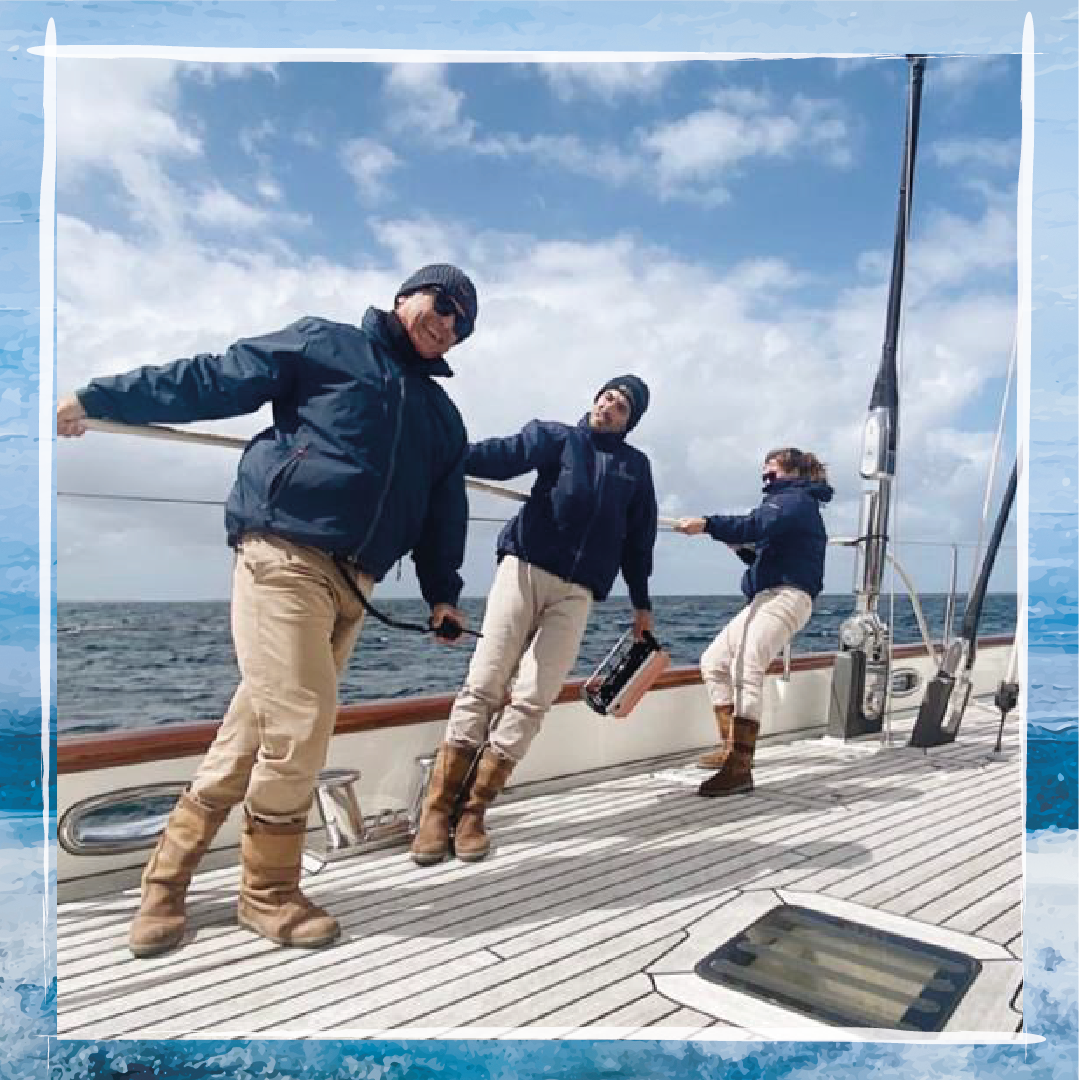Are you feeling burnt out? Superyacht crew have a tendency to burn the candle at both ends, often finding themselves feeling overworked, overwhelmed and fed up with their career. Emma Baggett industry professional and founder of The-Om, speaks with us about the different things superyacht crew can do to stay happy and focused in their career.
Superyacht Crew: How to Stay Happy and Focused in Your Career
Your career can send you off on many tangents or keep you in a rigid and structured cage. Either way, it is easy to drift, being carried along without a clear plan as to where you are heading. Sometimes it can take a while to get to that point when you know you are ready for something new. Some people get that lightbulb moment, that flash of inspiration, but for most of us, it does not always happen like that. It is a more slow realisation that you are not actually that happy or fulfilled by your job anymore.
Perhaps you have not drifted at all. Your career has followed a carefully prescribed plan. The realisation comes when you have finally achieved the goal you have spent years striving towards, the Captain, Chief Officer, Head of Department position, with rotation that you thought was the ultimate accolade.
It often comes when you are sitting in the departure lounge waiting for your flight back to work. You experience that moment of clarity, that home, a simple life and frankly everything that you thought you didn’t want, is looking pretty attractive and, to be honest, you could happily contemplate never flying anywhere ever again.
I speak to professional crew daily, who are admitting reluctantly that they are burnt out, disillusioned, and are struggling to see a future in the industry. They hold senior positions onboard, jobs that they have worked very hard to achieve and on paper look like they have the “dream ticket”. Great income, rotation, several properties bought and rented out, great toys, clothes, cars, watches and Instagram accounts that support the “living the dream” illusion.
It’s not surprising that for many, their career and their enthusiasm has a finite life. After a while, the pressures of the industry and the relentless toll of the seasons can leave you feeling like you are experiencing Groundhog Day. It might look like you’re working in paradise, but the reality of the yacht, and your surroundings, leave you feeling captured and confined.
Over the last two years, the impact of COVID on yacht crew and the long-term effects on mental health cannot be overstated. Surveys and reports continue to prove the fallout and impact on superyacht crew will continue to be felt. Much of the issue also sits with the industry itself, not recognising that a few fundamental changes to the way it values and supports crew would also help to minimise the tendency for short-term careers and vastly improve the work-life balance and longevity of those that operate the owner’s prize asset.
In the yachting industry, wanting something more, or more to the point, recognising that something vital is missing does not always mean leaving the industry. In fact, I think it’s the most common mistake that yacht crew make. It is not all doom and gloom. Sometimes, investing time in yourself, making a few adjustments, setting some new goals and finding new inspiration in your professional development can make all the difference and bring back the vital spark you are looking for.
Half the battle is acknowledging the issues and the problems and admitting to yourself that something needs to change and, if you decide you are ready to leave and seek the next stage of your career, it can be difficult to know where to start. What are your options? How will you maintain your earnings? Will you be happy? It’s a lot to consider, but with thought and planning and a bit of effort, life does successfully continue.
The first step in moving forward is identifying the answer to the following question – “Are you sure you want to leave the industry?”
If the answer is “yes”. Then it would be best if you committed to no knee jerk decisions. Your exit needs to be planned, researched and realistic. You need to take your time.
If the answer is “no”. Then you need to identify what actions you need to take to re-set, recharge and refocus, to find fulfilment in your current career.
Is it your job?:
Are you staying on board a vessel in a role that is making you miserable because you’re determined to display longevity on your CV?
Having preached the importance of longevity, commitment and professionalism for years, I will admit something – it’s all very well but being miserable can have such a long-term effect on you, that sometimes you just have to think of yourself first.
I don’t advocate flouncing off and leaving your vessel in the lurch, but don’t let yourself get deeply unhappy unnecessarily. It’s a waste of your energy. Even with the best planning and consideration, some jobs don’t turn out to be what we think they will be, and once you have given it your best shot, it’s best to admit that for all concerned. Or is it the opposite? Maybe you work on a fantastic vessel with a great crew and owner, but you are no longer happy, and you are reluctant to leave because you know how good your situation is? Either way, if you are unhappy, you need to act.
Feeling burnt out? Don’t be afraid to stop for a while:
Stopping doesn’t mean coming to a complete stop but, it could mean giving yourself some breathing space. Having a proper holiday, travelling, or simply spending some time enjoying a simple life is hugely beneficial.
Taking a full season out of the industry will not adversely affect your career if you can illustrate how you have benefited from doing so. You might be able to do this within your rotation or it might mean a bigger decision.
Is it time to resign and move on, or would your vessel consider a kind of sabbatical? Would they support you in taking a few months or a season out and returning refreshed and repurposed? It’s always worth asking and negotiating before thinking that handing in your notice is the only option. The key is making the time that you take work for you.
Find a mentor or coach to find a way forward:
Don’t keep things to yourself. Talking to your fellow professionals and seeking guidance and wisdom from others is a very effective way to find out what you really want to do and how to achieve it.
A mentor will use their professional experience to help you understand your options and share knowledge, insight, and advice. A coach will help you help yourself by asking key questions that give you the tools to understand and develop your own personal pathway.
Look at the LEGASEA initiative to find a mentor: www.legasea.org.uk or look at the www.lifeafteryachting.com platform to find a coach and mentors who specialise in careers after you leave the industry.
Focus on your mental and physical health:
This may be an obvious one to discuss. Still, huge benefits can be gained from focusing on your body and mind. Mental and physical fitness, or lack of it can affect your well-being, focus, and a sense of purpose and worth so much more than many people realise. Spending time working on your fitness levels, eating healthy and understanding what your body needs to function can all have a huge impact on your happiness and confidence and inner calm.
Stress, unhappiness, excess alcohol, lack of sleep, are the perennial issues suffered by superyacht crew. They can all have an impact on your cortisol levels and be affecting you far more than you may be aware. Don’t be afraid to admit if you are suffering from your mental health and reach out to friends and colleagues and the organisations that are there to help you, like www.yachtcrewhelp.org
Financial planning:
Everyone will tell you this, but money gives you choices, it also gives you the ability to have time out and breathing space to think things through or it could be the factor that allows you to spread your wings and set up your own business or retrain for a new career path. Spending on luxuries and short-term thrills is great for a while, but if you haven’t done it already, make sure you maximise the income you earn, stop spending and start saving, especially if you are thinking of leaving the industry.
Set a goal and work towards having a target amount of savings. Put some structure in place, invest in property and don’t bury your head. Educate yourself and take some good financial advice, www.crewfo.com can offer you a broad range of advice to put you in the best possible financial position.
Adjust your outlook:
You may not realise that you have developed a pretty negative approach to life. If you imagine this analogy, it might put this into perspective. (From The 7 habits of successful people, Stephen R Covey)
You plan a day out, but on the day the weather forecast is awful, are you the sort of person who cancels the day? Or do you enjoy the day despite the weather? You can’t change the weather, but people who are proactive don’t let themselves be adversely affected by it; they control their own narrative. Conversely, reactive people allow external circumstances to dictate their behaviours and emotions and let themselves be a martyr to it and might say things like, “It wasn’t my fault” “It was out of my hands”. Think about how your reaction to the outside influences around you onboard could be adjusted, and you might find this is really helpful.
Write a bio document:
A “Bio” or biography document is an overview of your working life that is not structured in the way a CV is. It is a way of looking at your achievements, skills and accomplishments in the round. Write freely and when you’re done, try editing it back to a page, then take a good long hard look at yourself. I will be honest, this can be an excruciating exercise if you are not very good at promoting yourself, but it’s a handy tool in identifying your strengths and potentially the gaps in your skillset. It also gives a potential employer a much broader understanding of what you can offer.
Use your rotation and annual leave wisely:
If you haven’t done it already, plan to use your rotation time off to work better for you. Not only to take time out but to use it to achieve things that make you feel happy and fulfilled or plan and research your future plans. There is potential to target and gain working experience with organisations that interest you, consider giving back and volunteering at a charity, perhaps go back to your roots and teach kids to sail?
Invest in your professional development. Get excited about what you can learn and achieve:
Just because you have achieved success in your maritime qualifications or position onboard doesn’t mean that you have nothing left to learn. In fact, it’s just the start. There are so many courses that can be studied online by distance learning. Look for courses that bring you knowledge that you can apply to improve your performance in your current role and that improve your long-term employability.
The main thing to remember is that leaving the industry is not your only option. In fact, there are many steps that you can take before you reach that point. It’s all about how you approach it. Maybe it is time to move on and is the catalyst to break into something new or it is about finding the perspective that keeps you focused and brings you newfound enjoyment in your role. Take the initiative, and see it as a positive step to start planning, thinking, talking and actively seeking that fresh path.
If you’re interested in continuing to learn and the themes of this article resonate with you, Emma Baggett and her company, THE OM, have partnered with MLA College to develop an opportunity for superyacht crew to access a final year BSc or MSc In Sustainable Maritime Operations. This degree is delivered via online distance learning, designed to be accessible and completely flexible around working routines. If you don’t have previous academic qualifications, you can use your CoC’s gaining entry. With the opportunity for qualified masters to jump straight to an MSc. Whether you want to build on your maritime qualifications or translate your experience and qualifications gained in the sector into a successful career ashore, find out more http://the-om.co.uk/smo. Wondering how difficult completing a degree whilst working on board a superyacht is? Have a read of Emma’s recent interview with a student currently on the course.
Are you looking for your next position in the superyacht industry? Head over to our Jobs Board.
















.png)








